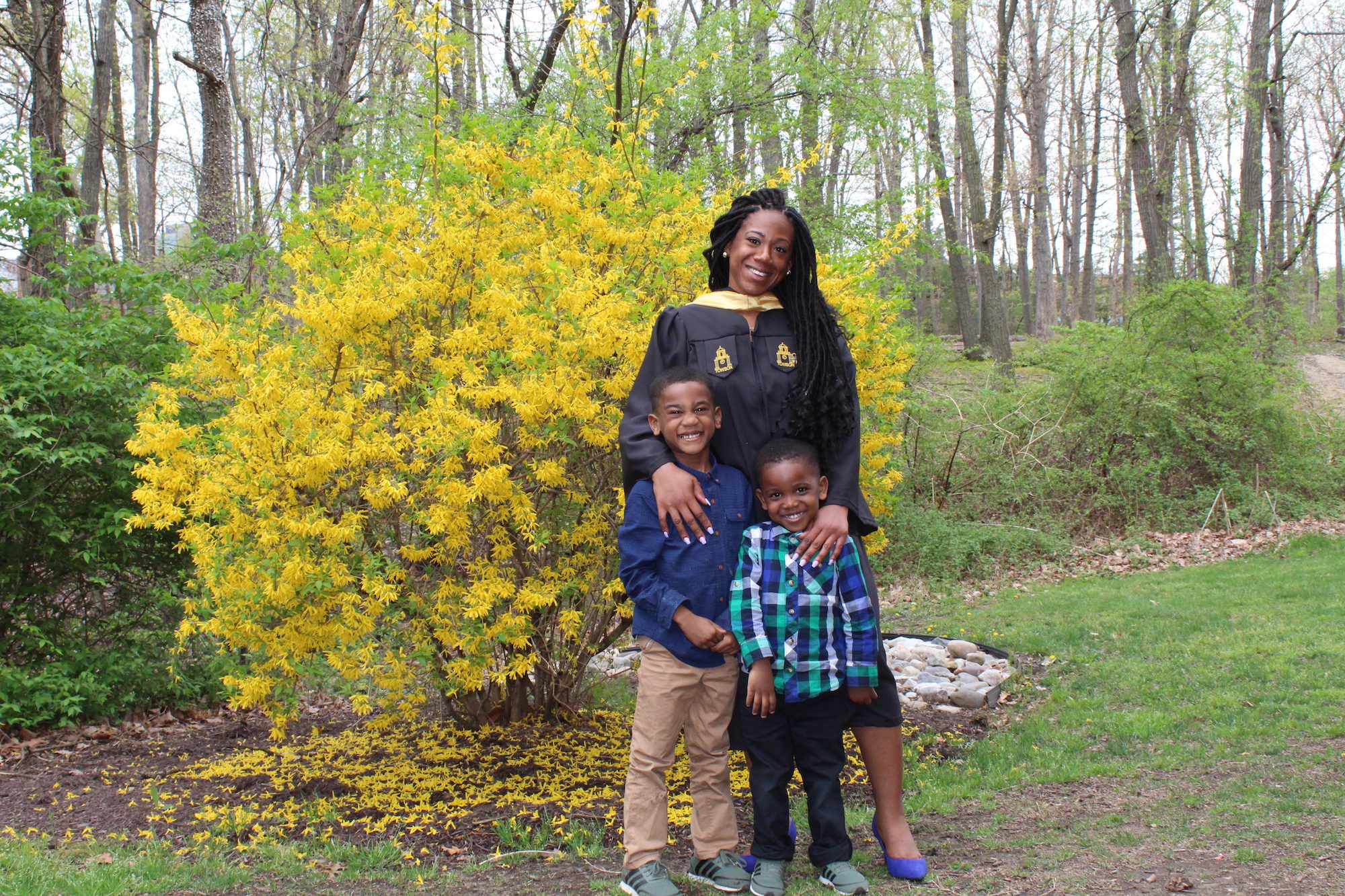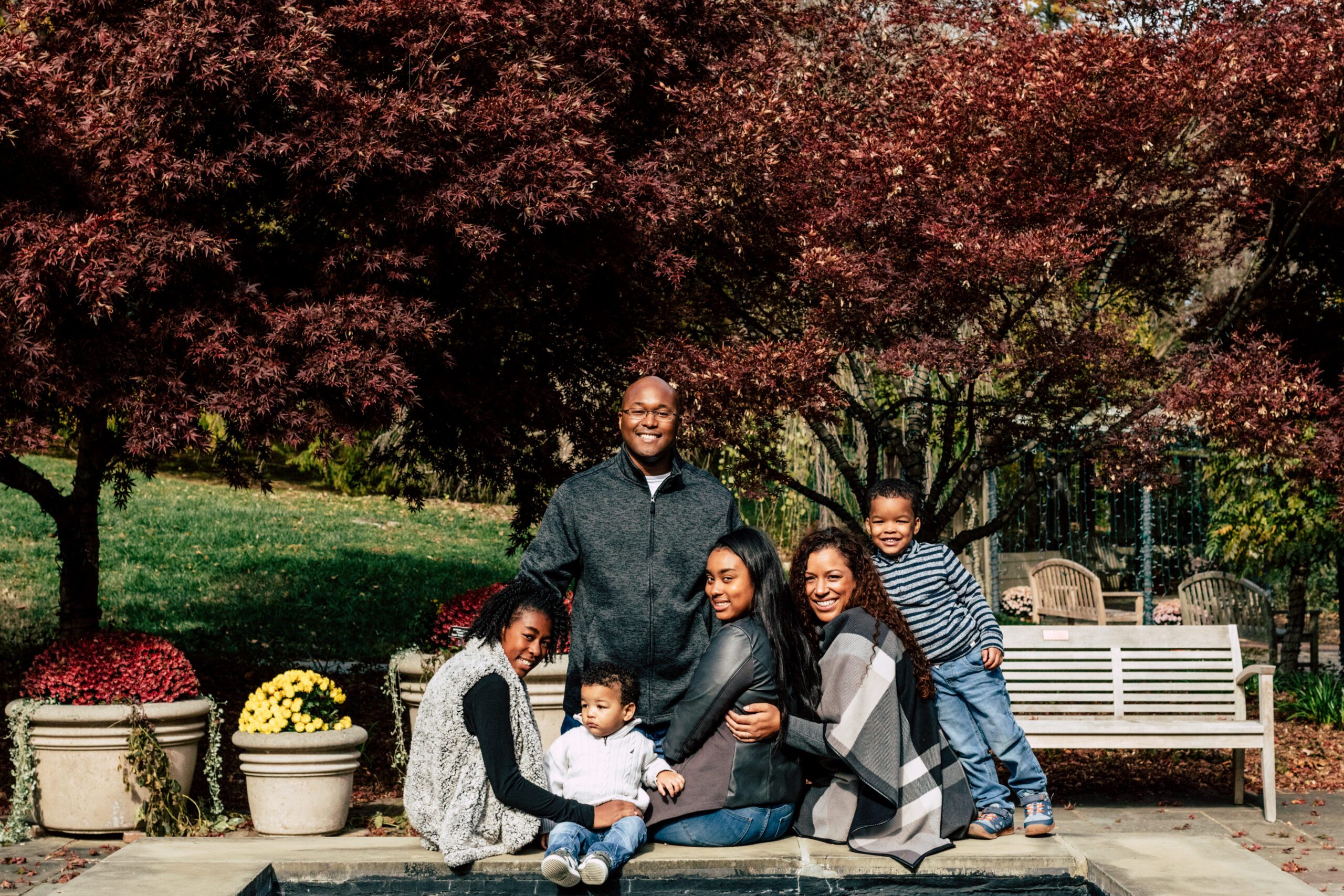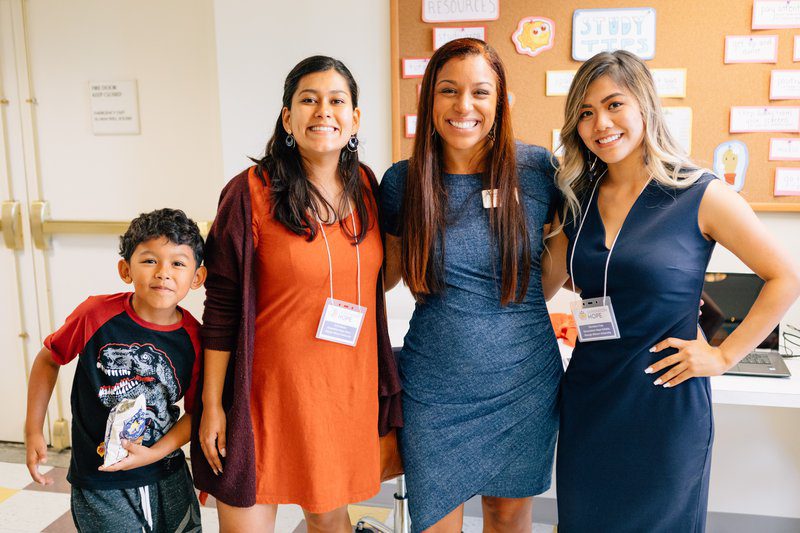United States 
Making Education Dreams a Reality for Teen Parents and Their Children
Why We Invested: Generation Hope
United States 
Why We Invested: Generation Hope

Lakeya with her two sons on graduation day
At 19, just after her high school graduation, Lakeya learned that she was pregnant. Her dream of attending Montgomery College in Rockville, Maryland, now seemed like that— just a dream. Instead of moving into a dorm with friends, Lakeya stayed home with her mother to raise her son. She enrolled in school a couple of years later only to find out she was pregnant with her second child. This time, she decided to continue her studies. “I had a reason to finish,” Lakeya says.
After completing her associate’s degree at Montgomery College, she transferred to Towson University to pursue a bachelor’s degree in Deaf Studies, finally getting closer to fulfilling her dream of giving back through teaching. But with two children, finding time and support to finish her degree was challenging. In her last semester at Towson, she learned about Generation Hope, which she credits with getting her over the finish line.
“Finally, a community that supports people like me,” Lakeya says of the moment she found the Generation Hope application. “During my last and toughest semester, I needed it.”
Leading with Lived Experience
Helping teen parents like Lakeya, and her children, succeed is exactly what Nicole Lynn Lewis set out to do when she founded Generation Hope in 2010. The Washington, DC-based nonprofit helps teen parents pursue their postsecondary and professional dreams through a variety of support services, including mentorship, tuition assistance and case management.
The inspiration for launching Generation Hope comes from Nicole’s own lived experience. Similar to Lakeya, Nicole was also a teen mother when she entered The College of William & Mary. She felt the stigma of being a teen mother on campus and struggled through the challenges of balancing life as a new mother and a college student.
“Like so many teen parents, I was told that my life was over when I discovered my pregnancy,” says Nicole. “But my education became even more important to me at that moment. We see that same unwavering motivation in the students we work with every day at Generation Hope.”
Research indicates that fewer than 2% of teen mothers earn a college degree before age 30. Inspired by the thousands of teen parents like herself, Nicole created Generation Hope to change this discouraging statistic and lift up the many teen parents who, with a bit more support, can succeed in college. Nicole used her experience as a student parent to inform Generation Hope’s approach to supporting the educational success of parenting teens.
Nicole has inspired a new generation, providing a different image of what teen parents can achieve: She has been named a CNN Hero, was included in Washingtonian Magazine’s Top 40 under 40, and was featured on Good Morning America. Soon, she will be sharing her story with the world through her book, Pregnant Girl, slated to be released in Spring 2021. Nicole is a visionary leader, who leads with empathy, love, and a core belief that, with some support, all teen parents can succeed.

Nicole Lynn Lewis and her family
Like so many teen parents, I was told that my life was over when I discovered my pregnancy,” says Nicole. “But my education became even more important to me at that moment. We see that same unwavering motivation in the students we work with every day at Generation Hope.
Nicole Lynn Lewis, CEO, Generation Hope
The Core Programming – Focusing on Two-Generations at a Time
Embedded in Generation Hope’s programs is an emphasis on a two-generation approach, supporting the educational success of student parents and the healthy development of their children. The organization’s two core programs—The Scholar Program for student parents (Scholars) and Next Generation Academy for the pre-kindergarten children of those in the Scholar Program—represent this dual focus.
The Scholar Program provides student parents with the financial and emotional support needed to succeed in college while raising a child, including continuous case management and academic support, access to a mental health care through an on-staff mental health coordinator, and year-round career readiness coaching. Next Generation Academy provides cognitive and family support to young children of Generation Hope Scholars with the goal of ensuring each Scholar’s child enters kindergarten ready to succeed. After one year of Next Generation Academy, 93% of children in the program are on track with age-appropriate communication, problem solving and motor skills.
Generation Hope also pairs each Scholar with a mentor through graduation and provides connections to critical resources, including child care, mental health professionals, and up to $2,400 in tuition support.
For Lakeya, being connected with a mentor who could help her navigate the uncertainties of life beyond graduation was invaluable. “My mentor always listened and gave the best advice she could. She was honest and gave comfort when needed.” Generation Hope has also created a community of support, or “extended family” for Lakeya and many other time-strapped student parents who value its network and the ability to form close connections. “Generation Hope was an opportunity to hang around others while also enjoying time spent with my boys,” Lakeya says. Through Generation Hope, Lakeya participated in educational activities with her kids, including a field trip to the College Park Aviation museum.
The COVID-19 pandemic made fostering this sense of community challenging, but Generation Hope swiftly moved to introduce virtual coaching and programming to keep Scholars on track despite the uncertainty of the pandemic, and has disbursed nearly $20,000 in emergency aid to their students in the last month. The organization’s popular “bedtime stories” series on Facebook Live also helps build community and keep children engaged in learning and play. Past bedtime story readers have included U.S. Senator Chris Van Hollen (MD), Broadcast Journalist and Executive Producer Soledad O’Brien, News Anchor Alison Starling, President of Montgomery College, Dr. DeRionne Pollard and Founding Director of the Hope Center for College, Community, and Justice, Dr. Sara Goldrick-Rab.
These efforts have made a difference — 95% of their students maintained a GPA of 2.5 or higher this year.
Turning Statistics—and Perceptions—about Teen Parents on Their Head
In the ten years since its founding, Generation Hope has transformed the lives of nearly 200 teen mothers and fathers, putting them on track towards college completion and on a pathway to economic mobility. Most of Generation Hope’s Scholars are the first in their families to attend college, are disproportionately Hispanic/Latino and Black students, and several are Dreamers (recipients of the Deferred Action for Childhood Arrivals program). Many Scholars have experienced homelessness, lived in foster care, survived abuse and experienced food insecurity.
Despite the significant barriers these student parents face in achieving their degrees, 92% of Scholars either stay in college and in Generation Hope’s program, or graduate from their postsecondary program. Generation Hope’s graduation rate among its Scholars is almost double the graduation rate of low-income college students and almost nine times the graduation rate of single mothers nationwide. These are impressive results!
Perhaps even more heartening is the long-term impact of Generation Hope’s investment in students that many have overlooked. In 2019, 81% of graduates were employed full time in their desired career within six months of graduating, and 23% were pursuing a graduate degree. Within this group, 17% are both working and enrolled in graduate studies.
Scholars like Lakeya work hard to beat the odds because they know that a college degree can be a pathway to greater economic security. “I never realized how important a degree was until I had children. I came to an understanding that making minimum wage for the rest of my life will not help me move out of my mother’s house.”
Keeping Student Parent Perspectives Central

Generation Hope Scholars with Nicole Lynn Lewis
Both Imaginable Futures and Generation Hope believe that student parent voices must be central to any discussion of policies or programs that aim to support their college success. In keeping with its founding strategy to use the lived experience of teen parents to inform its work, Generation Hope recently launched a national survey, supported by Imaginable Futures and Chegg.org, to establish more concrete information around the college experiences of the student parent population before working to broaden the organization’s reach to provide guidance and technical assistance to colleges and universities to increase their capacity to serve this population.
Generation Hope’s national student parent survey found statistics that shed light on the dire challenges that this population faces on campus. Several examples are:
With this new research, Generation Hope has identified a new set of metrics we must work to improve. “We want institutions to ensure that the needs of parenting students are factored into the way that they deliver their services,” says Nicole. “Not only is this an equity issue, but with higher GPAs than their non-parenting peers, student parents offer a real opportunity for increased retention and completion rates — these are things that every college and university is striving for.”
Reflecting on the daunting statistic that just under 2% of teen moms obtain a degree, Lakeya notes, “Generation Hope always gave us the hope and comfort that transformed into courage and confidence to change the statistical outcome of being teen parents.” By investing in student parents and organizations that center their lived experiences, Imaginable Futures is committed to helping Generation Hope and others turn the statistics on student parents around—for good.